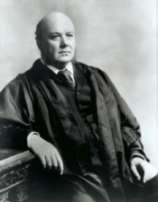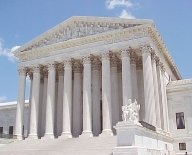Sixth Amendment Court Cases - Arraignment Clause
Each of these Sixth Amendment Court Cases is somehow significant to the way
the Supreme Court has interpreted the Arraignment Clause in the Sixth
Amendment to the US Constitution. Well, most are significant, some are just interesting! You can read about the history and meaning of the Sixth Amendment here.
Sixth Amendment Court Cases
There have been relatively few cases that have reached the Supreme
Court regarding the Arraignment Clause, compared to the huge volume of
cases some other Amendments have generated. This is due to the fact
that the process of notifying someone of the specific charges against
them has become such a rudimentary part of the American legal system.
The few cases that have come to the Court have been about how to apply
the Arraignment Clause.
Sixth Amendment Court Cases - Arraignment
Clause -
United States vs. Carll
United States vs. Carll, 1881, was a case in which a man was charged with passing counterfeit money. Or was it? That was the question the Supreme Court answered in this case. The language used in the charge against the defendant was taken straight from the Federal statute which had allegedly been violated. The charge literally said the defendant has broken the following statute, which read:
"Every
person who, with intent to defraud, passes, utter, publishes, or sells
any falsely made, forged, counterfeited, or altered
obligation or other security of the United States shall be punished by
a fine of not more than five thousand dollars and by imprisonment at
hard labor not more than fifteen years."
Each count of the indictment listed a certain place and time and said that the defendant:
"feloniously,
and with intent to defraud the Bank of the Metropolis, which said bank is a corporation organized
under the laws of the State of New York, did pass, utter, and publish
upon and to the said Bank of the Metropolis a falsely made, forged,
counterfeited, and altered obligation and security of the United
States."
The problem was this, the indictment gave times and places of the
alleged crime, but did not
give any evidence or specific allegation that the defendant knew the bills were
counterfeit, which is obviously required in order to be violating this
statute. The question before the Supreme Court was, did merely
repeating the allegedly broken statute sufficiently satisfy
the Arraignment Clause requirement that a defendant be
informed of the nature and charges against him.
 Supreme Court Justice
Horace Gray
Supreme Court Justice
Horace GrayThe Court decided that this use of the statute language did not
sufficiently satisfy the Arraignment Clause notification requirement
and threw out the conviction. Justice Horace Gray said in the Court's
opinion:
"In an indictment upon a statute, it is not sufficient to set forth the offense in the words of the statute unless those words of themselves fully, directly, and expressly, without any uncertainty or ambiguity, set forth all the elements necessary to constitute the offense intended to be punished, and the fact that the statute in question, read in the light of the common law and of other statutes on the like matter, enables the court to infer the intent of the legislature, does not dispense with the necessity of alleging in the indictment all the facts necessary to bring the case within that intent."
The fact that the language used in an indictment must be very specific
is extremely important. For one, you could not defend yourself against the
charges if you didn't know what the charges were, or if they were
vague. Or, people could be charged with things they didn't even do and
not be able to defend themselves. Secondly, prosecutors could try
people on very vague charges that could even be completely false. They could try people they didn't
like or people who held different opinions than they did. People could
be sent to prison because of the whims and prejudices of
officials. That would not be good!
Sixth Amendment Court Cases - Arraignment
Clause -
Rosen vs. United States
In Rosen vs. United States, 1896, the defendant was charged with distributing
through the US mail a paper that was judged to be "obscene, lewd, and lascivious." The
indictment filed against the man did not expressly describe the
contents of the paper, because the subject matter was judged to be
improper for decent people to discuss. Instead, the indictment used
less offensive language that adequately described the situation without
being overtly graphic.
The defendant claimed that his 6th Amendment Arraignment Clause right
to be notified of the charges against him had been violated because the
language of the indictment did not spell out specifically what was on
the paper.
Predictably, the Court did not agree with the defendant. The ruling said that however general the
language was in the indictment, it still described the
situation well enough so as to reasonably inform the accused
of the nature of the charge sought to be established against him.
Sixth Amendment Court Cases - Arraignment
Clause -
United States vs. Cruikshank

United States vs. Cruikshank, 1876, is one of the most well known
and influential Sixth Amendment Court Cases judged by the Supreme Court.
The circumstances surrounding Cruikshank are these: After the Civil War, almost all former slaves in
the South became Republicans, naturally, the party of Lincoln. Still
racist whites were in control of the Democrat party. In a controversial
Louisiana election, the Republican party won many offices, but the
Democrats threatened violence if the Republicans moved to take those offices.
In the town of Colfax, the local Republicans had gathered around the
courthouse to protect it from being taken over by marauding, racist
Democrats. In the ensuing battle, several hundred African-Americans
were killed by the Democrats. Later, charges were filed against some of
them. The charges were not for murder, but for conspiring to hinder the
African-Americans from exercising their Constitutional rights to
assemble, bear arms, exercise free speech and others.
In a remarkable decision, the Court threw out the convictions based on
two primary things. First of all, the Court declared that
the Arraignment Clause notification requirement had not been
satisfied. The indictment against the alleged conspirators claimed that
the men had violated the rights of the African-Americans, but did not
give specific details about how they had done this. As mentioned
several times above, the Court requires that the language be specific
in order that the defendants may know how to defend themselves and also
that the court may be able to examine the facts and judge whether or
not the law was broken.
Secondly, the Court threw out the convictions because it said the
United States did not have jurisdiction over the areas of alleged
violation - meaning freedom of speech, the right to bear arms, the
right to peaceably assemble and so forth. The Court was referring to the fact
that the original Bill of Rights did not apply to the states, only to
the Federal government. The states could regulate these things, but the
Federal government could not. Thus, it was the states, the Court said,
that had the jurisdiction and therefore had to rule whether these
rights had been violated or not.
This decision seems convoluted according to our thinking today. Over
the years since the 14th Amendment was added to the Constitution to
assure equality to African-Americans, the Court has gradually required
that all the States, as well as the Federal government obey the
restrictions in the Bill of Rights as well.
This means that no government, federal ,state or local can make laws
regarding the rights listed in the Bill of Rights, including the
Arraignment Clause of the 6th Amendment.
Since the Court has interpreted the 14th Amendment's Due Process Clause
to mean that the Bill of Rights applies to the states, most of the
Cruikshank decision has been overturned. The part about the wording of
the charges being very specific, though, is still considered law today.
Read
more about the history and meaning of the Arraignment Clause here.
Read
more about the history and meaning of the 6th Amendment here.
Learn more about Sixth Amendment Court Cases relating to the following
Sixth Amendment clauses:
Sixth Amendment Court Cases -Speedy
Trial Clause
Sixth Amendment Court Cases -
Public
Trial Clause
Sixth Amendment Court Cases - Right
to Trial by Jury Clause
Sixth Amendment Court Cases - Confrontation
Clause
Sixth Amendment Court Cases - Compulsory
Process Clause
Sixth Amendment Court Cases - Right
to Counsel Clause
If you would like to read about the meanings of each amendment, go to
the First
Ten Amendments page here.
Amendments:
Preamble
to the Bill of Rights
Learn
about the 1st Amendment here.
Learn
about the 2nd Amendment here.
Learn
about the 3rd Amendment here.
Learn
about the 4th Amendment here.
Learn
about the 5th Amendment here.
Learn
about the 6th Amendment here.
Learn
about the 7th Amendment here.
Learn
about the 8th Amendment here.
Learn
about the 9th Amendment here.
Learn
about the 10th Amendment here.
Read
the Bill of Rights here.
Return
to Arraignment Clause
Return to Sixth Amendment
Return to Main Bill of Rights page
Revolutionary War and Beyond Home
Like This Page?
© 2008 - 2022 Revolutionary-War-and-Beyond.com Dan & Jax Bubis










Facebook Comments